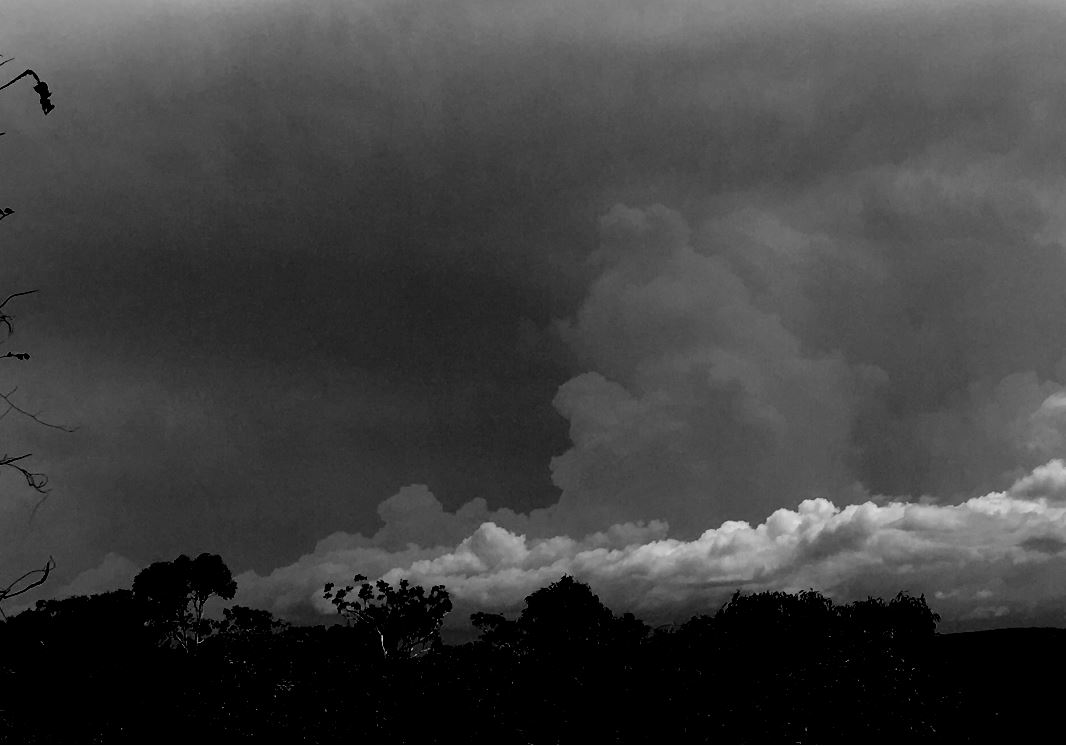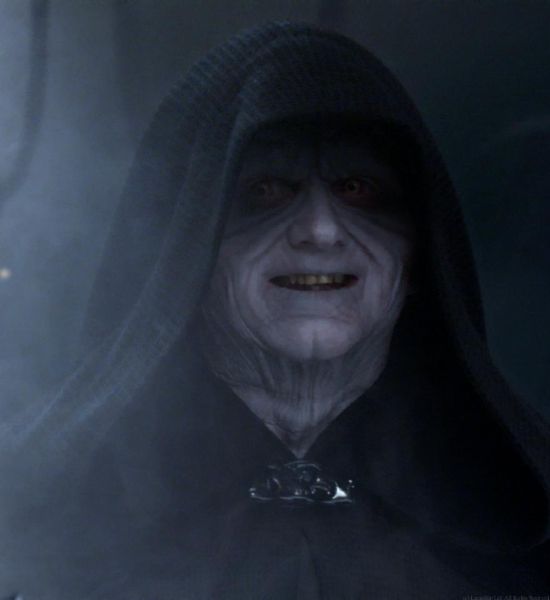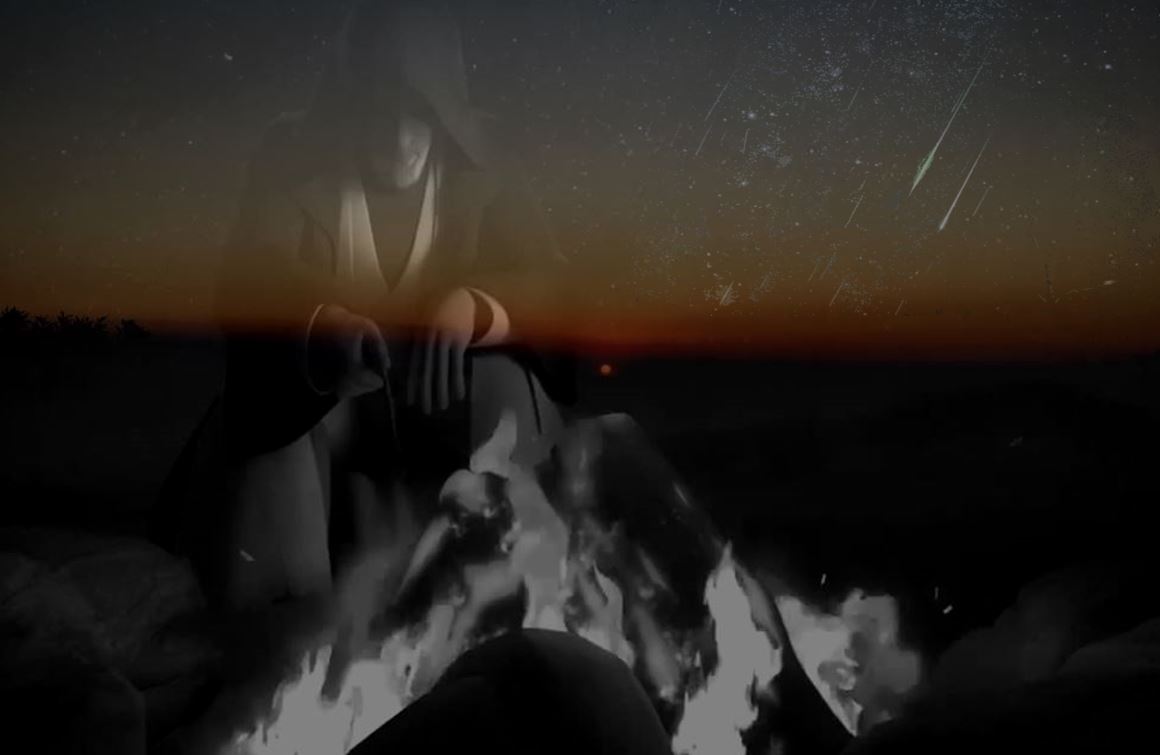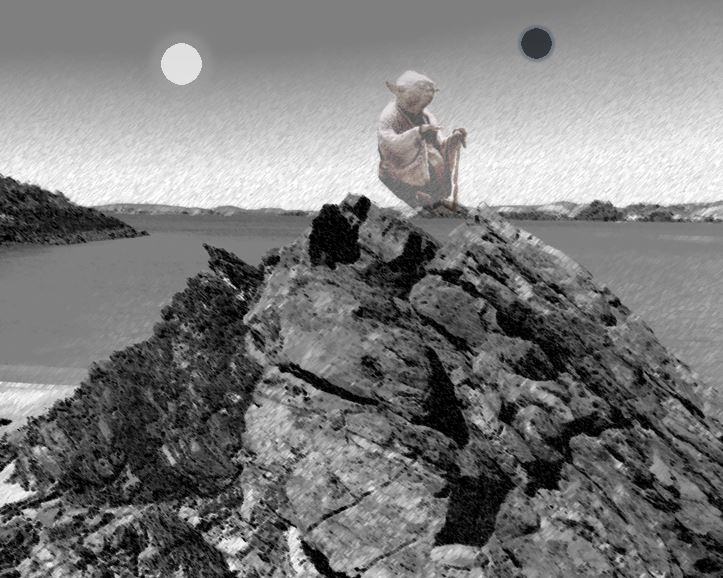
The Face of Evil
Supreme Chancellor Palpatine or better known as Darth Sidious is portrayed as an evil character in the Star Wars saga. The very essence of the Dark Lord brings a dark and sinister air to the story. Darth Vader is also depicted as menacing and evil. The musical score which announces the entrance of Vader in “A New Hope” and more recently in “Rogue One” leaves one with little doubt that this is a figure of some dark and diabolical evil.
As children we are taught to fear. Evil is defined as something real and tangible. Our childhood religions personified it in the image of the “Devil” and blamed him for human errors. Evil is given names and made into a label we can assign to almost anything. We are never asked to question whether our impression of what appears Evil is valid or false. Indeed few of us are ever told that we might also be considered evil by others whom stare at us across a social, racial, ethnic or political divide. Should we be surprised? It is human nature. Our perceptions do not make us or anyone else “evil” in reality.
Evil by Name only
What is evil? Is it some metaphysical embodiment that exist like some dark mass existing in the ephemeral plane ? Is it something real and tangible which can be identified through empirical science and a dichotomous key? We need not think too hard. Society, our teachers, parents and friends give us plenty of examples to consider evil.
In my childhood I was taught that certain religions and entire nations of people were to be considered evil as it is in their very nature. Communism, I was assured was the epitome of evil spawned by the Devil himself. Of course none of this was correct. I have since learned that a person’s religion, political views and race does not make them either “good” or “evil” by definition. There are preferred and non-preferred indifferences but people are just people. What makes a person “good” is no more set in stone as to what makes them “evil”.
A matter of Opinion
Emperor Palpatine in the true form of Darth Sidious, did not believe that he was evil. The Dark Lord could justify his actions plainly and convincingly. Whether it was a delusion on his part or a blatant lie the (then) Supreme Chancellor Palpatine suggested to Anakin that the Sith were misunderstood and that the polar opposite of the Force is needed to ensure balance in the cosmos. According to Palpatine, the Jedi also could not be considered a true “Good” as the Sith could not be considered a manifestation of evil. Both descriptions were he argued were too simplistic and misleading;
ANAKIN: The Jedi use their power for good.
PALPATINE: Good is a point of view, Anakin. And the Jedi point of view is not the only valid one. The Dark Lords of the Sith believe in security and justice also, yet they are considered by the Jedi to be—
ANAKIN: Evil.
PALPATINE: From a Jedi’s point of view. The Sith and the Jedi are similar in almost every way, including their quest for greater power. The difference between the two is the Sith are not afraid of the dark side of the Force. That is why they are more powerful.
ANAKIN: The Sith rely on their passion for their strength. They think inward, only about themselves.
PALPATINE: And the Jedi don’t?
Devil’s Advocate
Supreme Chancellor Palpatine had a point which struck a chord with Anakin. Skywalker had long questioned the apparent inconsistencies and hypocrisy he had experienced in the Jedi Order and had grown disillusioned. Palpatine recognized this slither of doubt and used it to his advantage widening the apparent cognitive dissonance which Anakin grappled with constantly.
Palpatine was not indoctrinating Anakin in to “Evil”, he was making him look at things from a different angle. Anakin was led to question everything he believed. The end result was that he abandoned the Jedi Order and became Sith. At no point did Anakin declare “I want to be Evil”. It did not enter in to his decision. Anakin was angry and upset and hateful but that did not make him “evil”. Anakin felt he was doing what was “right” at the time. He picked his side and acted out.
PALPATINE: Or so you’ve been trained to believe. Why is it, then, that they have asked you to do something you feel is wrong?
ANAKIN: I’m not sure it’s wrong.
PALPATINE: Have they asked you to betray the Jedi code? The constitution? A friendship? Your own values? Think. Consider their motives. Keep your mind clear of assumptions. The fear of losing power is a weakness of both the Jedi and the Sith.
 Source: http://swfanon.wikia.com/wiki/Darth_Sidious_(KHS)
Source: http://swfanon.wikia.com/wiki/Darth_Sidious_(KHS)
Uncomfortable Truths
A concept of good and evil does not belong in a discourse on the conflict between Sith and Jedi as neither concepts exist in reality. Good and Evil is simply a construct that is arbitrarily defined by society at a given point in time. Those that accuse another of “Evil” are often guilty of the same crimes. History often fails to record this fact.
Obi-wan Kenobi also believed that the belief in “good” and “evil” was ultimately a matter of perception and not entirely based on knowledge. In reality the polar opposites of the Force “Light” and “Dark” exist in harmony with each other. A Jedi does not (or should not) believe in “Good” and “Evil” as absolutes or intrinsic elements within a system.
“Many of the truths that we cling to depend on our point of view.” – Obi-wan Kenobi
Horrors
Emperor Palpatine went on to commit horrific crimes with his ascension to supreme executive power and dissolution of the Senate. Order 66 was given resulting in the complete purge and eradication of the Jedi Order without mercy. Force sensitive children in the temple were massacred without pity.
The Death Star was later created to impose Imperial rule on the galaxy. Entire planets with billions of lives were destroyed without warning as leverage or in punishment. The Death Star destroyed worlds to test the weapon. A brutal war of attrition raged between the Empire and the Rebel alliance for decades at an immeasurable cost in sentient life and treasure.
We can argue that the Empire was evil beyond any doubt. Who perpetrates such horrors? The Empire under Darth Sidious was also simply doing what it felt was necessary in war time to impose its will over its dominion and enforce its authority. The Rebel alliance were viewed as terrorists and the Jedi an extinct brand of religious fanatics that preached some fantasy and brainwashed children to their cause. The Republic and later the Rebels also saw their cause as noble and just. If we are objective we can conclude that neither side was inherently “Good” or “Evil”. Such is often the case in war here on Earth. Atrocities and mistakes are committed by all sides.
“I’m not a terrorist. I’m a patriot. And resistance is not terrorism.” – Saw Gerrera (The Clone Wars – Season 5, Episode 4)
Manifest Destiny
Hitler believed that his philosophy of racial purity and a manifest destiny for the Germanic-Aryan people was “good”. Millions of people embraced that ideology and as a result genocide and horrid atrocities were justified. Today there are few people who would not agree that the Nazi doctrine was evil. Likewise Stalinism is widely considered evil but is still practiced in some countries which are likewise labelled “Evil” by our Governments.
Saddam Hussein gassed Kurdish civilians as the world watched on in 1988. Up to one million Iraqi civilians subsequently died in the two punitive wars against the Saddam regime and the economic sanctions imposed during the intervening years. Again the Saddam regime was blamed for these deaths, making him even more evil in the eyes of the west. More recently atrocities are being committed by both sides in the Syrian conflict.
We decry these acts as “evil” and indeed they are by our definition. Yet if we seek an explanation from a prominent Nazi, a senior member of the Iraqi Baath party or current players in the Syrian conflict we will be assured that the acts committed seemed reasonable and justified to them at the time. At the war crimes tribunal in the Hague most of the perpetrators of ethnic genocide in former Yugoslavia were unrepentant and without remorse because they believed they were in the right. We rarely consider how different our own statesmen and politicians are in their motives for going to war. Evil is something the other side does, we don’t back that team. Do we?
Master or Slave
George Washington kept slaves yet he freed a nation from colonial rule and eventually his own slaves. Thomas Jefferson owned hundreds of slaves and may have even raped a few. Jefferson was also an advocate for emancipation. It does not change the fact both men profited off slavery. We all agree that slavery is vile and evil however two hundred years ago the practice was common and accepted in the very countries that strongly advocate for human rights and social justice today. Washington and Jefferson unlike many other landowners of the time, suffered a degree of cognitive dissonance about keeping slaves. That much is certain. They preached that all are “created equal” yet had people in bondage. Both still accepted that change had to come and dared to rise above the common view of the time and take action to reduce that internal dissonance.
Views changed over time and the emancipation movement grew until slavery was abolished in the United States. Modern day views do not change the past or excuse them. We can only learn from history and avoid judgment using the standards of our day over times and people we will never entirely understand. By our standards that Washington and Jefferson were slave owners is clearly objectionable today but few would dare call the revered founding fathers “Evil”. In their day, both would have been considered remiss by their associates and peers not to have carried slaves. Let us not forget that the Native Americans like indigenous populations everywhere also suffered terribly under a doctrine of racial supremacy and industrialization “at all costs”.
“For if one shows this, a man will retire from his error of himself; but as long as you do not succeed in showing this, you need not wonder if he persists in his error, for he acts because he has an impression that he is right” – Epictetus. (Discourses, II.26)
Framing Reality
Psychologist use the word reification to describe the apparent human need to embody inexact human traits in to an independent and metaphysical symbol. “Evil” is seen as “out there” when actually it is just people doing really bad things they rationalize as “right”. Failure to recognize wrong or to justify actions that could be deemed morally wrong or even “evil” is sometimes called rationalization. It is not that people are blind to wrong but they can frame it differently and convince them selves that what others might consider to be wrong or “Evil” entirely justifiable if not “Good”.
Psychologists also point out that reification allows people to justify singling out groups of people, organizations, religions or entire races or countries as “Evil”. I know white people who grew up in apartheid South Africa. They recall the lessons in race they received as part of the mandatory curricula in school. Black people they were taught were a lesser race, not because they were bad people but because they were considered genetically and physiologically inferior. Black people it was argued could not help it as they are born that way.
Entire generations of white South Africans have since realized that this form of reification was completely wrong and engineered by a regime desperate to remain in power out of fear of what would happen if black people were allowed to gain majority rule. The regime rationalized that their theories on race were correct and segregationist policies justifiable. Even the most intelligent and rational human being would accept this ideology. Many Governments survive by creating an imaginary foe or enemy that threatens the common good. At the same time they use the psychology of fear to breed division. Our differences rather than our commonality are used to control us and dehumanize people who are no different to us.
Be Rational don’t rationalize
Rationalization diminishes the extremely uncomfortable association with cognitive dissonance. It allows us to be manipulated and to manipulate ourselves. Cognitive Dissonance is the feeling you get when you know what you are doing is wrong but you can’t or won’t stop it. Your actions or behavior are contrary to your belief system or set of personal values and principles. This creates an inner tension and conflict. People will rationalize their behavior in order to reduce that tension. For example a rapist will convince himself that women “want” to be raped and will use reification to convince himself that all women are inherently “loose”. A Nazi will reify Jews as some sort of global cabal bent on world domination. Rationalization then further demonizes Jews to the level of subhuman and justifies the use of violence against innocent people.
Rationalization and reification can be used to create almost any paradigm the human mind desires and justify almost any means to an end. Almost anyone can be turned in to a pariah and labelled as Evil. Certainly the world has seen megalomaniacs, psychopaths and narcissists commit atrocities and horrific crimes. Are these people actually “Evil” or are they just sick? Do they fail to grasp reality as the vast majority do? Why do some of these people assume positions of power and are able to direct society toward their view and gain widespread support if not quiet acquiescence from the masses for their actions?
Dealing with the Dark Side
How do we deal with this “dark side” of human nature? Do we destroy “Evil” people only to see another rise up and take his or her place? Should we pity them and try to rehabilitate and reintegrate them into society? Is forgiveness and acceptance the key or revenge and restitution? Let us not forget that all of us have a “dark side” but no one gets up in the morning and says “I’m Evil” unless they are severely afflicted with psychosis and delusional personality disorders.
As thousands of “Foreign Fighters” return home to the west from service in the ranks of terrorist organizations such as “Islamic State” in Syria it is a question we need to ponder mindfully. What do we do with these people? People are now asking the question why did this fanaticism, this “Evil” emerge and why were so many seemingly intelligent and talented people drawn to it? As ISIL draws it final agonal breaths another group rises to replace it with as hard and unforgiving a doctrine thanks once again to the actions of western powers that claim to stand behind “universal” concepts of human rights.
Ignorance is Hell
We have all done things that in hindsight we regret. At the time we committed the offense we probably had a justification for doing it. That justification may have been largely influenced by personal views and biases that were a product of upbringing, education, peer pressure, experience or even delusions of the mind. Despite our reservations about our actions we would reduce any cognitive dissonance by finding justification no matter how flimsy to excuse our behavior. We would seek affirmation in the world that further validated our views and in finding we would select what to take as the truth, setting aside all evidence contrary to that preferred view. Ignorance trumps knowledge.
“There is no Ignorance, there is Knowledge” – Jedi Code
The Stoics argued that the concept of “Evil” is too simplistic and an easy card to draw. People are not born evil and are not evil by nature. Acts that appear “evil” are rooted in ignorance or as the Stoics believed lack of wisdom. The Stoics also believed that the only “good” were “virtues” such as justice, courage and wisdom. Evil acts are therefore the product of lack of wisdom. Ask any perpetrator of “evil” acts for a justification of their actions and they will affirm that they were right and refuse to accept an alternate view. The person may be otherwise intelligent and articulate but within them resides an impenetrable wall which refuses understanding and forgiveness and is mired in a deep rooted conviction in the righteousness of their cause. Hitler, Saddam Hussein, Kaddafi and Pol Pot are among a parade of despots and dictators through history who were all highly intelligent but suffered from this mental deficiency. Is it right to call them “Evil”?
“There is only one good, knowledge, and only one evil, ignorance.” – Diogenes Laertius
Taming the Beast
What keeps most addicts in abuse? You guessed it rationalization. Alcoholism can lead people to do horrific things. Should we call them “Evil” or merely sick and ignorant? As an alcoholic I used reification and rationalization to justify my actions and reduce my own cognitive dissonance. The beast was given free reign. I did some bad things but do not consider myself “evil” then or now. I do not claim to be “good” either.
Consider the process of recovery is the progressive reversal of an insidious disease using a spiritual remedy. When an alcoholic or addict accepts that she is afflicted with a disease that is reversible but incurable there is a move from ignorance to knowledge. When that addict also recognizes their faults and accepts their part in the damage their actions have caused others they move further along the trajectory from ignorance to knowledge. By taking responsibility for her actions and seeking to make amends she is proving that knowledge can be converted in to action. Those around her begin to realize that what appeared to be a “lost hope” can be saved and forgiven. People can climb out of the pit they dug themselves in to and bathe in the light of the world once more if they find a spiritual cure.
A spiritual solution
I take comfort in the promise that with enough practiced principle and a solid spiritual foundation a relapse into active abuse and destructive behavior is unlikely. Cognitive dissonance is reduced. To quote someone in a 12 step meeting, “it’s impossible to get blissfully wasted and turn in to an asshole with a head full of program”. If we adjust our mind away from the patterns of thought that we grapple with, our actions will eventually align with our beliefs. Cognitive dissonance through knowledge and honestly makes it hard for us to think one way and act another. With the Force behind us it’s even harder.
“Evil” may be nothing more than a temporary affliction requiring a spiritual cure. Remember that before judging others and condemning them as “Evil”. Like Anakin, we all have a dark side that can come out to play if we let it. If we convince ourselves enough that what is false is true we open ourselves to error and very bad decisions. Only knowledge and virtue prevents that. We should be Jedi and be forgiving of others as we are self forgiving but also accept only what is true. We should seek to understand before we judge others. By accepting ignorance we are not “Evil” but we may allow “evil” to perpetuate itself in ways we cannot foresee or imagine.












